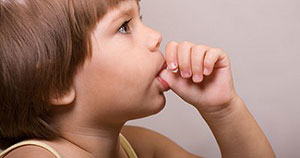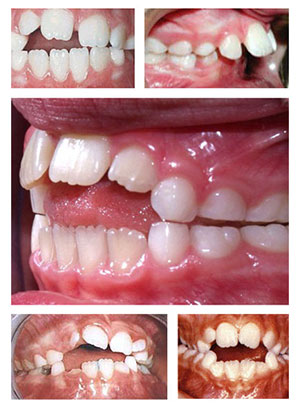Dr. BERTRAND R. STUART DDS.
Like many parents, you may be concerned about your child’s thumb sucking, finger sucking  or pacifier (“comforter”) use. You may wonder if it is harmful, at what age it should stop or what could happen if your child does not stop.
or pacifier (“comforter”) use. You may wonder if it is harmful, at what age it should stop or what could happen if your child does not stop.
You can rest assured that sucking is one of an infant’s natural reflexes. They begin to suck on their thumbs or other fingers, pacifiers while they are still in the womb. Infants and young children may suck on thumbs, other fingers, pacifiers and other objects. It makes them feel secure and happy, and it helps them learn about their world.
Placing a thumb or another finger in the mouth provides some children with a sense of security during difficult periods, such as when they are separated from their parents, surrounded by strangers or in an unfamiliar environment. Since thumb sucking is relaxing, it also may help induce sleep. For this reason, young children may suck their thumbs in the evening or at other times when they are tired.
Prolonged thumb sucking may cause problems with the proper growth of the mouth and the alignment of teeth. By prolonged I mean in excess of five years old. The habit can also cause changes in the roof of the mouth. In such cases the dentist will have to use a palate expander if orthodontic treatment is eventually required.
Children who rest their thumbs passively in their mouths are less likely to experience difficulty than those who vigorously suck their thumbs. When an active thump sucker removes his or her thumb, a popping sound is often heard. Some aggressive thumb suckers may also cause problems with their primary (baby) teeth.
Pacifiers can affect the teeth in essentially the same way as does sucking on fingers and thumbs. However, pacifier use often is an easier habit to break. The same can be said of rare cases whereby the child continues to suck their mother’s breast even after his or her fourth birthday. If you offer an infant a pacifier, use a clean one always. Never dip a pacifier in sugar, honey or other sweeteners before giving it to an infant.
Most children stop sucking their thumbs or other fingers on their own between the ages of two and four. The behavior lessens gradually during this period, as children spend more of their waking hours exploring their surroundings. Peer pressure also causes many school-aged children to stop placing their fingers in their mouths. If a child does not stop on his or her own, parents should discourage the habit after four years. However, excessive pressure to stop can do more harm than good.
Parents need to consider the following:
1. Instead of scolding the child for thumb sucking, offer praise for not doing so.
2. Children often suck their fingers when feeling insecure. Focus on correcting the cause of the anxiety and comfort the child.
3. Reward the child when he or she avoids thumb sucking during a difficult period, such as being separated from family members.
The dentist also can encourage the child to stop sucking his or her thumb and explain what could happen to teeth if the habit continues. I even show the child pictures.
If these approaches do not work, remind your child of the habit by bandaging the thumb or putting the hand in a sock at night. As a last resort, there are many techniques and methods used by dentists to break the habit.




.jpg)









